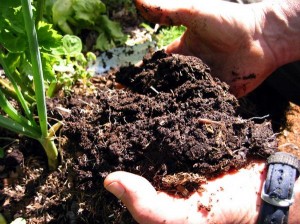
 Earth, soil, is the foundation of all our food and sustenance, and life itself. We need a real passion for earth care and all the elements that contribute to earth care, such as water, compost, mulch, worms and other organisms, if we’re going to grow consistently good, nutritious healthy edible plants and trees – and to achieve this we need the right education about the essential benefits of better earth care – growing and living organically, being chemical-free, encouraging biodiversity and much more.
Earth, soil, is the foundation of all our food and sustenance, and life itself. We need a real passion for earth care and all the elements that contribute to earth care, such as water, compost, mulch, worms and other organisms, if we’re going to grow consistently good, nutritious healthy edible plants and trees – and to achieve this we need the right education about the essential benefits of better earth care – growing and living organically, being chemical-free, encouraging biodiversity and much more.
As a professional permaculture and urban farming educator and consultant, probably the top complaint I hear constantly about people’s gardens, after the weather, is soil challenges – too sandy, clay soil, drainage problems and fertility issues. Given these complaints and challenges, I also hear people struggling with their poor soils for long periods without ever getting assistance from outside.
My experience is that most people don’t have such bad soils, as a foundation, but that fertility is missing, and that they don’t really understand, and therefore never work on soil fertility in their gardens. Your soil, just as much as what’s above ground in your gardens, is a complex ecosystem, with so much going on that we never see. This perceived complexity is perhaps behind the reason why so many people never seek professional soil care education and advice. But for success in the garden, especially growing our own food, it is essential knowledge.
For example, did you know that in a single teaspoon of ‘fertile earth’, from a thriving healthy garden, there exists several billion fungi, over one billion bacteria, several thousand protozoa, around 50 worms and worm eggs, nematodes, arthropods, multiple insects and other animals, such as mites, springtails, spiders, beetles, snails, pests and predators, plus seeds and plants.
That’s a huge amount of essential life and vitality in a single teaspoon of fertile soil, all working for you 24 hours a day, 7 days a week, 365 days a year – and all you have to do is feed and house them with a little organic compost, mulch, fertiliser, water and habitat. The reverse is, however, that if this complex web of life is not present in your soil, through ignorance, neglect or mismanagement, then your soil will remain lifeless and lacking, and eventually devoid of all life – and then not much, if anything, will grow, and what does, will be weak, lacking nutrients and easy for pests and diseases to prey on.
So what’s the solution? If your soil is not as fertile and vibrant as it could and should be to produce the nutritious abundant food you wish to grow, then you need to get down and dirty in your garden, get some education and advice to better understand your own soil and what needs to be done to correct and revitalize your earth. It’s much easier than you think, and it’s certainly not as technical or scientific as you might imagine.
One of the main focuses in urban farming and permaculture is soil care, because it’s so important to educate edible gardeners how to create and maintain soil fertility. Soil is where everything begins, or ends, with or without the right knowledge and skills in earth care.
My next 1-day soil care workshop, called Down to Earth, is coming up on Sunday 26 June, and will include training on soil care (composition, structure, soil pH, drainage, microorganisms, nutrients and humus), rebuilding ‘natural capital’, composting and mulching, no-dig gardening, worm farming and water-wise gardening. This workshop is a must for everyone keen to finally get their soil right and is the ground roots knowledge you need to start and continue growing great edibles.
For more info and bookings please visit Down to Earth Soil Workshop on Facebook.
